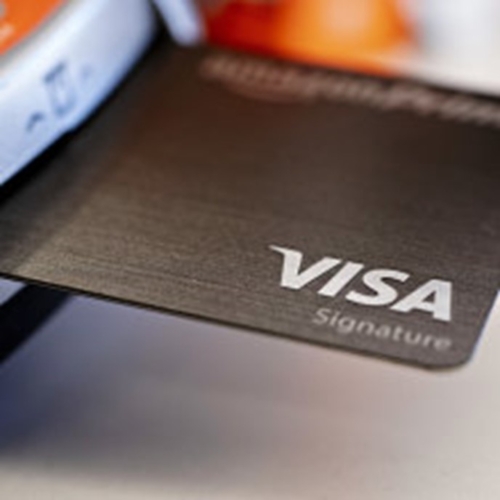14/07/21; Australian Financial Review
A start-up created by two mates from the University of Technology, Sydney has convinced global card giant Visa to approve the issuance of a physical debit card that will allow users of the CryptoSpend app to spend their bitcoin trading profits in shops and bars by tapping on existing payment terminals.
It will be the first time cryptocurrencies can be spent using a payments card issued in Australia that runs on the network of one of the international card schemes, and highlights global moves by Visa and Mastercard to make it easier to spend bitcoin and other digital currencies to pay for everyday items.

CryptoSpend co-founders Andrew Grech, left, and Richard Voice say more people will look to spend their crypto winnings in shops using plastic cards.
The growing ease of “off-ramping” crypto holdings via physical transactions using existing payments infrastructure runs counter to the core driver of cryptocurrency price rises earlier this year.
This was around bitcoin being more like commodities, providing a safe-haven asset from the debasement of fiat money by central banks. Most of the subsequent focus has been on how to trade bitcoin rather than spend it.
The Reserve Bank has not yet grasped the potential for bitcoin to be used to pay for things. It said in its latest submission to the Senate inquiry Australia as a Technology and Financial Centre, dated two weeks ago, that cryptocurrencies “are rarely used or accepted as a means of payment, they are not used as a unit of account, and their prices can be very volatile, and so they are a poor store of value”.
But Visa and Mastercard are looking to rapidly facilitate spending crypto at millions of merchants that connect to their networks worldwide, and PayPal allows customers to convert bitcoin into fiat currencies at checkouts to make purchases in the US.
High demand for card
CryptoSpend co-founder Andrew Grech said more crypto investors would look to cash out their trading gains in shops. “Spending it directly is a more convenient way of selling it,” he said. “We have a lot of demand for the card. If the market is green, someone could say it’s time to spend some of my profits. On the other side of the fence, another person might say it’s going to keep going up, I’ll hold onto it. But we have seen more spending volume when the price is going up.”
Mr Grech and fellow co-founder Richard Voice met in a class at UTS three years ago, where both were studying business and information technology. They now work out of the UTS Startups hub.
Visa put the pair through a rigorous process to ensure the privacy and security of users’ information and to ensure anti-money laundering requirements are met. It is set to announce its approval later this week.
The card will be issued by ASX-listed Novatti and is expected to be in the market in September. Custody of the crypto holdings is by BitGo, which is licensed as a custodian in New York. The card will also allow users to spend other cryptocurrencies including ripple, bitcoin cash and Ethereum’s ether.

Visa has approved Novatti to issue a prepaid debit card to allow CryptoSpend app users to tap and go on terminals in any retailer. Bloomberg
Visa has already approved the issuance of spending cards for some global bitcoin exchanges, including Binance, but these are not available in Australia. Crypto.com has been approved to be a direct issuer of Visa debit cards in Australia and is preparing to launch a card soon. BTC.com.au allows users to spend crypto funds with an EFTPOS card but it does not operate its own wallet.
Mastercard moved into the crypto spending space last year under a partnership with BitPay. The card giant said in February users of its network were increasingly using crypto cards to convert crypto holdings into traditional currencies for spending, describing the trend as “unmistakable”.
Mastercard said its philosophy on cryptocurrencies was about facilitating customer choice. “We are here to enable customers, merchants and businesses to move digital value – traditional or crypto – however they want.”
Visa said in a blog post last week the value of crypto assets held in regulated digital wallets was in the hundreds of billions of dollars, and it was developing relationships with 50 crypto platforms, including FTX, Coinbase, Crypto.com and CoinZoom, to facilitate spending.
Visa said more than $1 billion had already been spent on crypto-linked Visa cards in the first half of 2021.
“For the tens of millions of people using those platforms, one of the simplest ways to spend crypto is through a Visa card,” the company said. “We’re seeing digital wallets and crypto platforms build payment products entirely with digital currency.”
CryptoSpend is already linked into the RBA-backed “new payments platform” (NPP), which allows its users to instantly move crypto balances into Australian bank accounts. Customers are already able to pay bills using crypto balances through the app.
CryptoSpend, which launched last October, said it was increasing its users by 100 a month, and expected this to jump when the Visa card hit the market.
The Visa card has been designed as a “zero balance” card. Fiat is not loaded onto the card; rather, the balance is variable and draws straight from the value of the crypto in the wallet. It is not regulated as a stored value facility and balances are not guaranteed as in banks.
Mr Voice said the service would be pushed into the mass market. “You will find some people hold until bitcoin hits X price, but you will find other people that say ‘I have made $400 today, I am going to use my CryptoSpend card at the pub tonight’.”
Subscribe to our free mailing list and always be the first to receive the latest news and updates.
